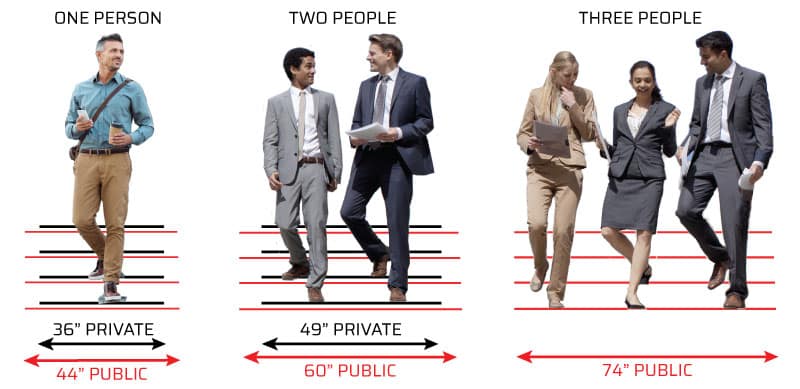
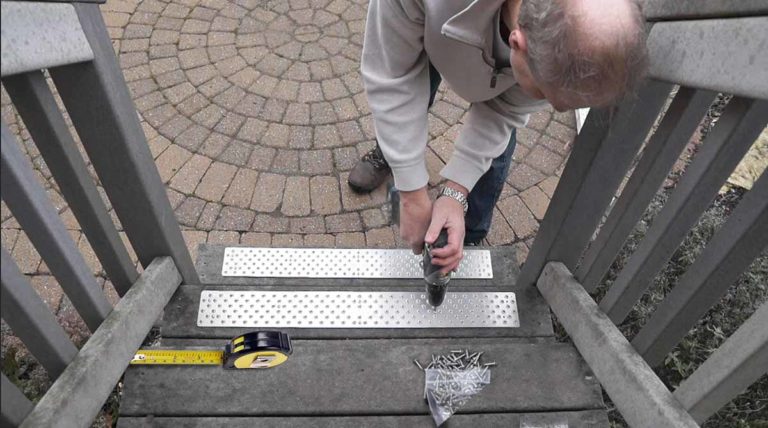
It is never too early to start preventing slips and falls, so it is important to do so before it is too late. One of the best ways to do so is with non-slip stair treads. In this comparison blog, we explored many varieties of non-slip stair treads available on the market today. As determined in the blog, HandiTreads aluminum non-slip solutions are often the most comprehensive and reliable choice when it comes to preventing dangerous slips and falls at your home.
Since HandiTreads non-slip stair treads are proven to make slippery outdoor stairs safer in all weather conditions, buyers’ next question is often, “how do I choose the right size HandiTreads?” Given the wide variety of stairs and HandiTreads lengths, it may be difficult to know which size is best for your needs. In this blog, we’ll discuss how to determine the correct length of our aluminum safety treads for your exterior stairs.
In this guide, we will examine the standard sizes of stairs, the appropriate non-slip tread size based on your stairs’ dimensions, and the suggested placement of the HandiTreads.
According to Dimensions.com, a minimum of 36” in width is required for single-family residential outdoor stairs. Generally, in public spaces a minimum of 44” must be met—providing ample space for one person and allowing the tight passage of two people. Comfortable two-person residential stair widths start at 49” and go up from there. For three simultaneous users, a minimum of 74” is recommended, but obviously you will find these super-wide sets of stairs in mostly commercial settings.
For single-family homes in the United States, the average front door stair widths are 48” and 60”. Everyone wants a grand entry to their home and wider stairs look, well, grander. In the back of a home, it’s more common to have stair widths of 36”.
Before ordering your HandiTreads, it is critical to first measure the width of your stairs. With that measurement in hand, let’s move on to choosing the correct size HandiTreads for your home.
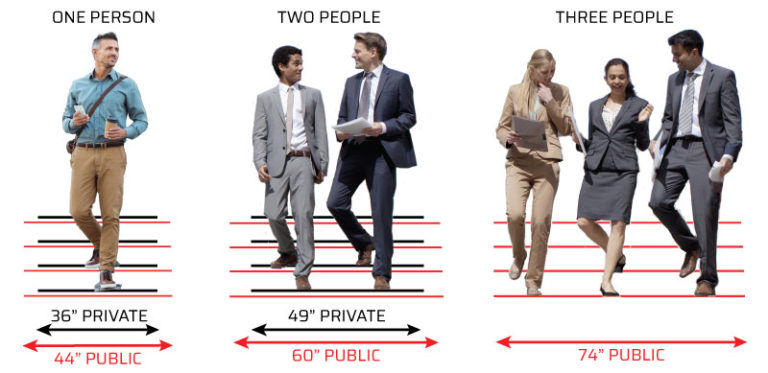
Standard straight stairs have stair treads with a depth of 9″-9/14″ and a nosing that typically hangs 1-1/2″ off the front of the stair. A typical stair rise is 8″ to 8″-1/4″ with each step, according to Simple Home Decorations.
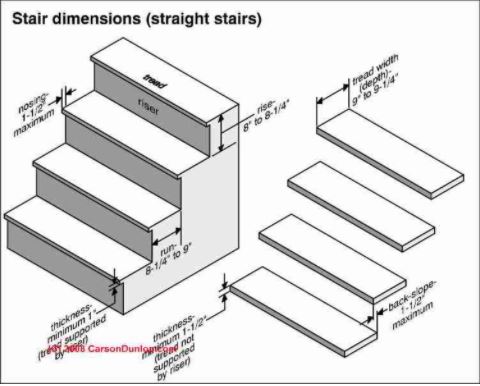
With the width of your stairs measured, let’s get on to the process of choosing the correct size HandiTreads for your home.
HandiTreads Non-Slip Stair Treads are 3.75 inches wide and come in three standard lengths including 30, 36, and 48 inches. These three sizes will accommodate nearly all residential outdoor stairs when used alone or in combination with one another. For example, while you might employ 36” HandiTreads on the stairs leading up to your front porch, 30” treads may be optimal for the stairs leading up to your deck in the backyard.
Let’s first consider a standard 36” front porch set of stairs. We recommend the 30” length HandiTreads as perfect for this staircase, even though 3” of the stair on either side of the treads would be exposed. Why this recommendation? The truth is that on any stairway, the three inches by either side of the rail are rarely stepped upon! Because the center of a stairway is where the traffic is, the tread doesn’t have to extend from edge to edge to provide excellent, non-slip protection. As a general guideline, we recommend HandiTreads be placed wherever someone will be stepping on the stair tread. If your steps are much wider, say 48” or 60”, we would recommend the 36” or 48” treads.
Likewise, this sizing guide applies to HandiTreads Non-Slip Stair Nosings, which are also available in 30”, 36”, and 48” widths. Differing from the stair treads, nosings have a 2.75” width as well as a 1.125” flap. This flap wraps over the front corner of the stair treads, providing extra traction and structural support on the stair edges.
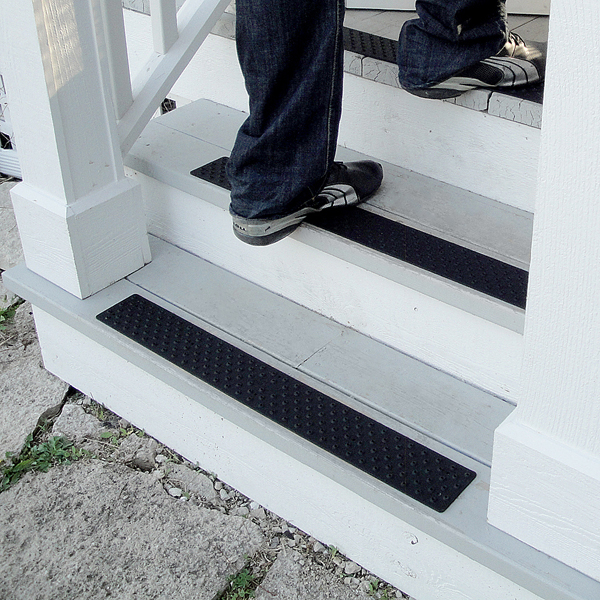
If you’re using a single aluminum tread, you will want to center it in the middle of each stair tread. Each of the HandiTreads should be aligned 3/4” from the front edge of the stair tread as shown above.
What should you do if your slippery outdoor stairs are substantially wider than the 48” non-slip tread? On a larger, double stairway of 60 inches or more, you’ve got a couple of choices. First, you could use two 30” treads side-by-side, effectively spanning the entire width of the stair. Alternatively, because most traffic comes up the center of the stairway, a 48” HandiTread centered on a 60” wide straight outdoor staircase would provide excellent non-slip protection in the most dangerous situations, such as when you’re using the stairs and carrying a package.
We’ve seen clients who have installed 30” aluminum non-slip treads along only one side of a wide set of stairs. While we do understand that this is a tactic that can be used to save money, we do not recommend this solution. There is no guarantee that you will always use that one side of the stairs. The majority of each stair tread should be covered by HandiTreads to ensure proper slip and fall protection.
When installing HandiTreads aluminum non-slip nosings, the same placement parameters explained above apply. The nosing should be centered on each stair tread, and two nosings can be used side by side on wider steps. The key difference between non-slip nosing and tread installation is the flap of the nosings. Ensure that the nosing fits snugly against the edge of the stair when installing it.

There are a lot of unique outdoor stair situations to consider. From rounded stairs coming off of a wooden deck, to randomly sized railroad ties winding down a wooded path, there can be a number of unusual circumstances to consider when selecting the proper size of HandiTreads. If this sounds like your situation, call us at 877-328-7389! We’re here to help.